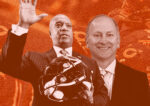The Chicago Bears pulled back the curtain on a planned $3.2 billion domed stadium along the city’s lakefront, which would anchor a mixed-use development near its longtime home Soldier Field.
Bears president Kevin Warren presented the stadium plans to city officials today, Crain’s reported.
Of the $3.2 billion estimated cost, approximately $2.3 billion would be sourced from private investment, underlining the Bears’ commitment to the venture. Taxpayers are expected to contribute $900 million upfront through bonds issued by the Illinois Sports Facilities Authority. In addition, the team is eyeing another $1.5 billion in public infrastructure funds, a move that has drawn support and skepticism.
Key components of the plan include immediate infrastructure needs totaling $325 million for the stadium’s opening, followed by subsequent phases featuring enhancements like new parking and multi-use playfields, as well as transportation improvements to boost accessibility to the nearby Museum Campus.
The proposed stadium itself boasts a striking design, featuring a translucent fixed roof with a transparent opening on the north side, offering views of the city skyline. Soldier Field, meanwhile, would undergo significant transformation, leaving room for 14 acres of multi-use sports fields amid its historic colonnades.
Despite concerns over the allocation of public funds, Chicago Mayor Brandon Johnson has thrown his weight behind the initiative, assuring citizens that it won’t entail new or increased taxes. However, plans to extend an existing 2 percent tax on hotel stays for another 40 years have stirred debate over the project’s long-term financial implications.
Gov. J.B. Pritzker, while expressing reservations, emphasized the need for prudent fiscal stewardship, citing recent public rejections of stadium subsidies elsewhere. The Bears, however, are keen on swift legislative approval, aiming to secure backing during the spring session.
State Senate President Don Harmon echoed the governor’s cautious stance, highlighting the substantial funding gap that remains despite the significant private investment. Meanwhile, Illinois House Speaker Chris Welch stressed the need for a balanced budget amid competing fiscal pressures.
The Bears’ financing strategy involves a complex mix of private funds, including loans from the NFL and anticipated revenue from marketing rights and personal seat licenses. Yet, uncertainties loom over the allocation of tax revenue and potential legal hurdles, such as a looming lawsuit from park advocacy group Friends of the Parks.
—Quinn Donoghue
Read more











